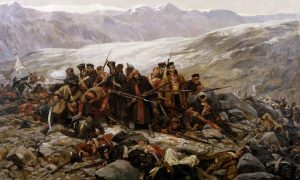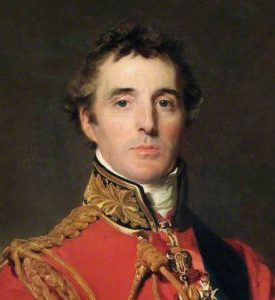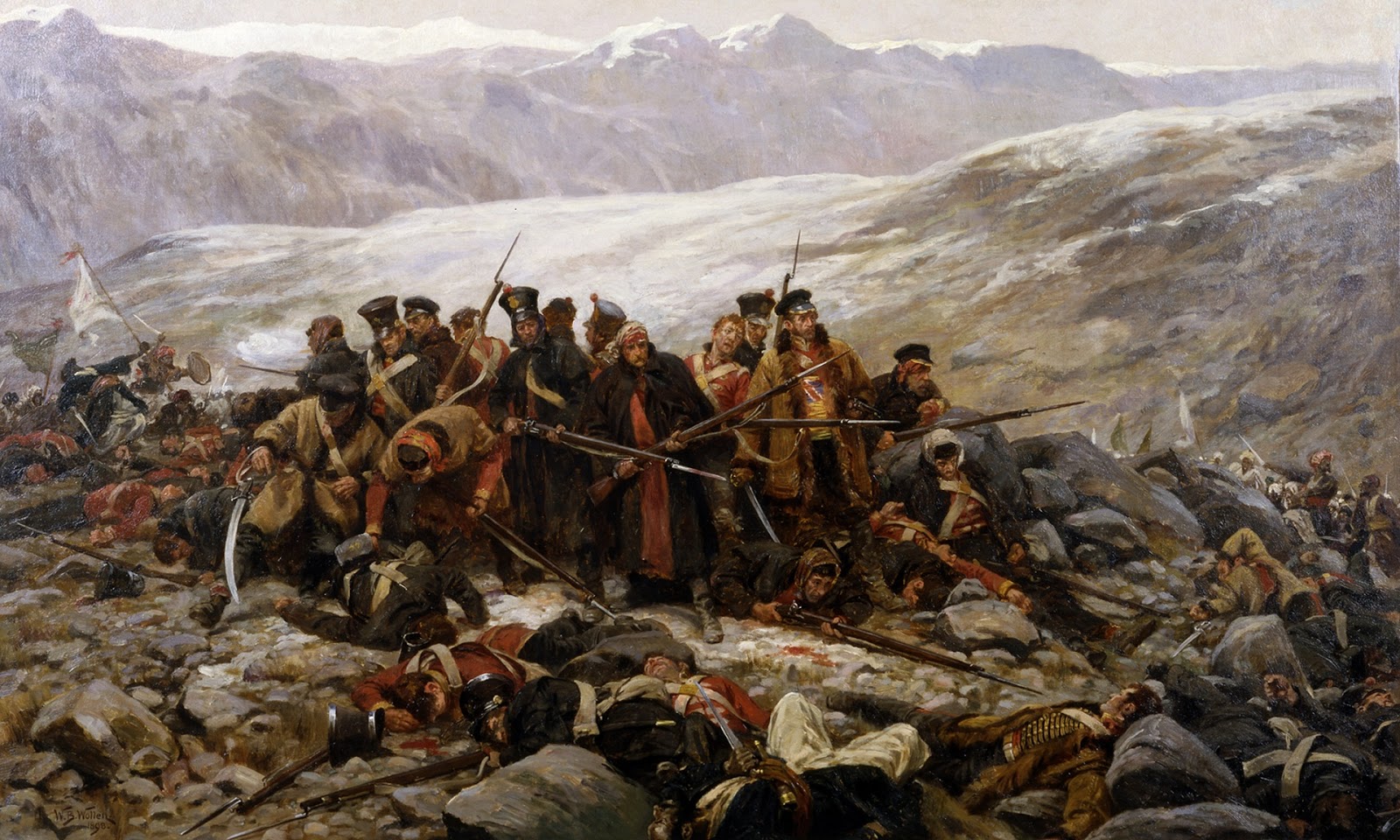
A few weeks ago, as I was reading Candice Millard’s Hero of the Empire (reviewed here on Concerning History), I came across a puzzling statement. In her prologue, Millard described the British army as “one of the most admired and feared fighting forces in the world.” Anyone familiar with the ersatz history of the British army in Europe or Britain’s imperial holdings might look askance at such a dubious claim, but I thought little of it at the time save to raise an intellectual (and physical) eyebrow. As is so often the case, however, this inciting incident opened my eyes to more and more instances of this or a similarly-worded error. I have since encountered it in material covering a diverse range of subject matter concerning Britain in the period of its empire, authored by historians spanning a wide array of training and background. Rather than composing a direct rebuttal of these claims of a superlative British army, I instead became preoccupied with determining the reasons one might buy into such an easily-refuted detail. What follows below is an account of my efforts and, incidentally, a fair amount of refutation in its writing.
The Largest Modern Empire Must Have Had the Best Army — This is the most basic source of confusion I can think of. An empire upon which the sun never set was not hyperbole when it came to Britain, and it’s not initially unreasonable to assume that such a large empire was conquered and maintained by the greatest military in the world at the time. There are subtle but definite distinctions between a state’s geostrategic power, military might, and the specific ability of its army, however. The spread of Britain’s empire beginning in the sixteenth century was by turns directed, unintentional, convenient, and hard fought. Eminent imperial historian John Darwin has called the British Empire “unfinished,” and indeed its sovereignty was a haphazard patchwork of informal influence, formally-ruled territory, and quasi-equal settler dominions. When expansion came militarily, it benefited more from the gross disparity in technology and training between Europe and subject peoples than any peculiarly-British excellence. As I hope to discuss in a future post, the modern bluewater empires operated under certain unique conditions not shared by contiguous land empires; the most pertinent here is that expansion overseas was possible while simultaneously lacking regional superiority in Europe. In comparison to its European rivals, then, Britain’s army was competent but not excellent, and even its own nation denigrated the morality and fighting ability of its (almost exclusively lower-class) soldiers.
Britannia Rules the Waves! — A military is more than just land-bound forces, of course, and Britain’s navy is nigh-legendary for its superiority, particularly after Britain’s victory in the wars of the French Revolution. Bluewater empires of course rely on some form of stable overseas arteries to sustain their holdings, and Britain’s thalassocracy certainly aided its unparalleled expansion. Extending this specific strength to the rest of Britain’s military could also be a source of misconception but, needless to say, such an idea doesn’t hold water.

The Iron Duke — As I mentioned above, Britain ultimately beat Revolutionary France in their three decades of intermittent war. This victory was total, and occurred on both land and sea. The shining moment of British land arms was the Battle of Waterloo, where the Duke of Wellington and his men stood firm and broke Napoleon’s attempt to revive his French European empire. Perhaps this fine bit of generalship and fortitude in the face of enemy fire has conveyed a false impression of more general British martial prowess?
Everyone Loves an Underdog Story… — Narratives of subject peoples and their resistance to or collaboration with imperial rule is inherently based on unequal power dynamics, but some authors feel the need to up the ante. This, I believe, was the inspiration for my original encounter with the myth. In her narrative of the Second Boer War, Millard pursued as one of her themes the plucky courage of the Boer commandos as they took on the daunting forces of an empire arrayed against them. As briefly mentioned before, Britain was certainly an imposing military giant, but no more so than any other European imperial power armed with cutting-edge technology and weapons of war. To inflate the reputation and fighting prowess of the British army in order to compound such an underdog story also ignores the dismal record of Britain’s imperial forces despite their considerable edge. Nearly every one of its small imperial wars opened with some kind of grave British defeat or humiliation, usually due to overconfidence, incompetence, or too-thinly-stretched garrisons. Eventual British victories were the result of the breathing room allowed by their advantages, to which was added a capacity for superior logistics and communication when necessary. As my supervisor at Oxford was known to remark, “The British believed that they always won in the end, so if they weren’t winning, it clearly wasn’t the end yet.”
…Especially Americans — Perhaps the most well-known such imperial underdog story (at least in the US) is the event of our own war for independence from Britain. The successful revolt of initially-untrained provincial settlers against the professional armed forces of their parent empire is certainly an upset nonpareil, but insidious impulses of American exceptionalism at times lead some to claim even higher laurels for Patriot forces. The United States is the greatest nation that ever was or ever will be; we were founded perfect and only got perfect-er; it stands to reason that for our freedom, we beat the best oppressing army the world had to offer. I exaggerate, clearly, but subconscious assumptions not too dissimilar to these inform much history writing in America, and has led to an inflated sense of American importance and, in the case of this post, other assumptions of British interest and martial excellence when involved with American history. There may even be some element of cultural transference, as pride in America’s superlative armed forces (historically justified or not) is projected onto our forebears and now-cousins.
I’ve observed or inferred some element of at least one of each of these in all the times I’ve observed this perplexing and persistent myth. Two traits shared by all, however, are historical isolationism and an unfortunate penchant for convenient rhetorical generalization. The first is a danger inherent in the very nature of history, as no person can be expected to know all things. It is not unreasonable to expect a certain level of research on pertinent topics before an historian discusses them, however, but such research is all too often lacking. Indeed, my own growing aversion to this neglect led me ultimately to the study of global and imperial history at Oxford. The second factor is also a systemic problem for those who write history, though in this case inherent to the act of writing. It is so dangerously appealing to use flippant phrases or convenient generalizations to introduce, frame, or lend relevance to one’s subject. These generalizations are by their nature fraught with inaccuracy, and should be responsibly avoided. Perhaps this is a fitting end to my musings, then. Regardless of which of my supposed reasons might prove most applicable, the antidote to all is simply an increased devotion to historical responsibility: research something before you say something.

2 replies on “A Persistent Fiction: Myths of British Martial Prowess and Their Appeal”
Some good insights here; I think the first point is the most guilty culprit though I can certainly see the other phenomena having an effect. There may be a bit of ‘the victor writes the account’ at fault as well. Out of curiosity, what would be the criteria for deciding “the most admired and feared fighting force in the world” in your opinion? Is such a determination even possible?
That is an excellent question, Riley, and one I’ve struggled with writing this post. It’s definitely easier to determine who wasn’t at the top than who was. Before the modern era and professional armies a winner is rather easy to discern: whoever won the most and established the largest empire of the time. In the modern era after European divergence from the rest of the world, that criteria needs to be drastically modified. Perhaps frequent victory against comparably elite nations along with the eagerness of those nations to adopt the training/tactics/practices of the victor. The latter is probably the easiest to determine in the sources, as equal contests between rivals in war are few and far between, especially from 1815 to 1914.